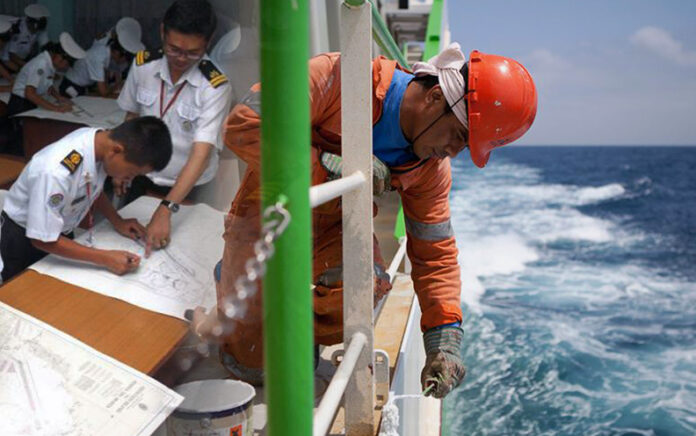-
The Philippines requested for technology transfer and capacity-building at a recent International Maritime Organization meeting in London to prepare Filipino seafarers for shipping’s transition to zero-carbon by 2050
-
Filipino seafarers need to be trained on decarbonization transition technology and to prepare for possible hazards from exposure to green fuels, according to Philippine officials
-
IMO member nations pushed forward with proposals that included a greenhouse gas levy or fee rebate mechanism, GHG fuel standard, emissions trading, and a benchmark-tied funding/reward system
The Philippines has requested for technology transfer and capacity-building at the recent International Maritime Organization meeting in London to prepare Filipino seafarers for shipping’s transition to zero-carbon by 2050.
The Philippine is a major supplier of seafarers.
The government told the IMO Marine Environment Protection Committee 79 (MEPC 79) meeting on December 12-16 that Filipino seafarers need to upskill and reskill to be able to adopt to decarbonization and be prepared for hazards they may face in the switch to green fuels.
The conference gathered industry stakeholders, scientists, environmental experts and climate change concern groups to address a broad array of issues with progress made in taking important steps forward on impactful regulation to drive decarbonization, the World Shipping Council said.
WSC said IMO member nations pushed forward in developing proposals that included a greenhouse gas (GHG) levy or fee rebate mechanism, a GHG fuel standard, emissions trading, and a funding/reward system tied to a specific benchmark.
Speaking for the Filipino seafarers, Neil Azcuna, technical adviser on maritime affairs at the Philippine Embassy in London, put forward his country’s role on the issue of cleaning the oceans as the largest supplier of seafarers to global trade and leisure vessels.
“We need to find ways to help developing countries like the Philippines in the preparation of our seafarers to transition into low- to zero-carbon shipping,” Azcuna was reported as saying.
“We realize that the success of our decarbonization goals is heavily dependent on people and their capacity building.”
Philippine Overseas Employment Administration statistics published by the Maritime Industry Authority (MARINA) showed the total number of Filipino seafarers deployed overseas dropped 54% in 2020 to 217,223, from 469,996 in 2019.
The plunge in seafarer deployment to international shipping was across all ranks, officers and cadets, but was largest in the non-maritime sector that provides hotel staff to cruise ships. The latter was a growth area for the Philippines crewing industry before the COVID pandemic grounded cruises following infections on board.
Current proposals before the IMO on mid-term measures to drive shipping’s energy transition address different components of what WSC regards as Six Critical Pathways that need to be considered to decarbonize the industry in line with global climate targets.
“Discussions surrounding IMO’s GHG Strategy show promise. There is a growing base of support in the Committee to proceed with development of a GHG levy as well as development of a GHG fuel standard,” John Butler, WSC president and CEO, said.
“Significant differences remain to be resolved on the use of tank-to-wake and well-to-wake GHG factors and the use of funds, but there is a growing sense of agreement on the principal mechanisms that are critical to addressing the GHG challenge at the global level,” said Butler.
“As such, we are seeing significant progress on a number of the Six Critical Pathways identified by WSC as vital to a successful decarbonization of shipping. On the whole, the outcome of MEPC 79 is encouraging as it reflects a growing base of support for major policy regulations at the global level.”
IMO is currently revising its existing climate strategy, which aims to only halve emissions from ships by mid-century. Member states must convene again in July 2023 to conclude the negotiations.
Vessel emissions must be halved by 2030 and must reach net zero by 2050 to meet the Paris Agreement’s target of keeping global warming to 1.5 degrees Celsius, scientists and experts said.
They sought early action to save the maritime industry some US$100 billion per year in decarbonization costs, preserving this capital for shipping’s green transition and support for the most vulnerable countries.
Only 10 countries expressed opposition to increasing the level of ambition at MEPC 79.
“What we have been calling for for years, is finally happening: the IMO is slowly, but without a doubt, making progress on climate. More and more countries now support eliminating shipping’s pollution by 2050,” said Sea at Risk campaigner Lucy Gilliam.
In preparation for the industry decarbonization, seafarers will need to be equipped with adequate skills and training, as voiced out by Azcuna, to operate new technologies and handle alternative fuels such as ammonia, which could pose a significant health and safety risk to them.
President Ferdinand Marcos Jr. discussed the need to upskill and reskill the maritime workforce in a meeting with the Department of Environment and Natural Resources in November.
IMO Secretary General Kitack Lim told reporters, “It cannot be stressed enough how crucial it is that we keep the momentum and deliver an ambitious and fair, revised IMO GHG Strategy at MEPC 80 next year.”
Lim said while countries recognize decarbonization’s seriousness, they were concerned about the economic impacts of the shift and the compensation.
“The final destination is July. The key element is we adopt a level of ambition, whether we support in 2050 net zero or [whatever] aspiration, and how we develop the tools… and how we produce alternative fuels for the future, and whether we agree on market-based measures,” he said.
RELATED READ: Shipping groups welcome PH vow to fix seafarers issues





